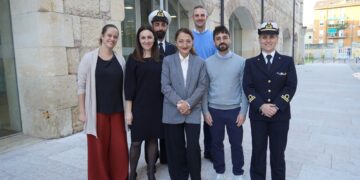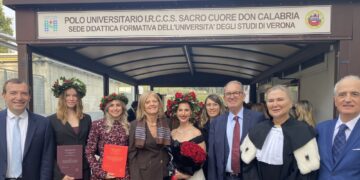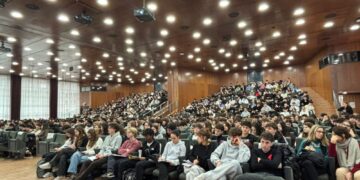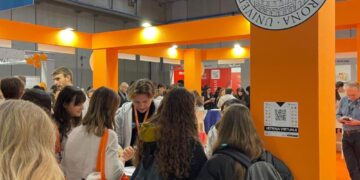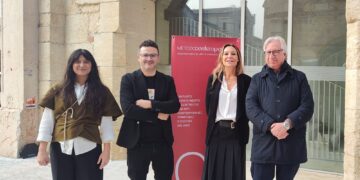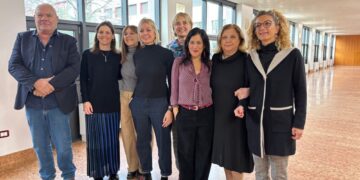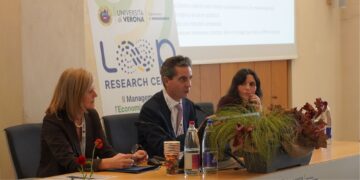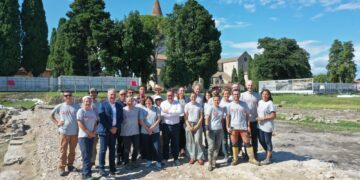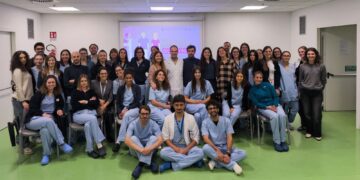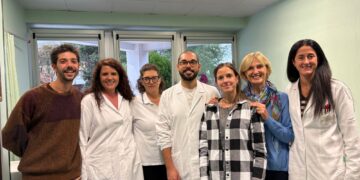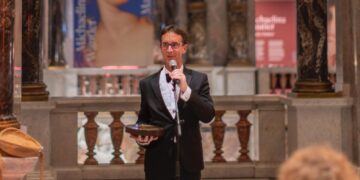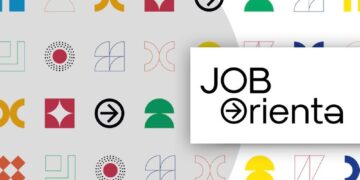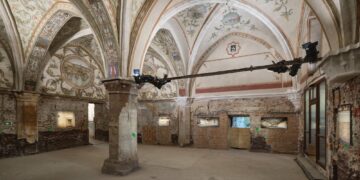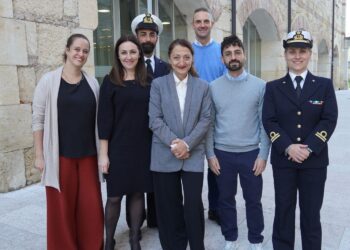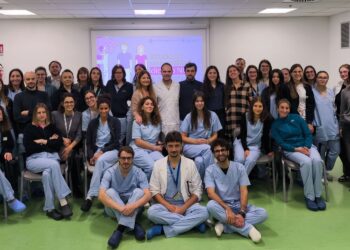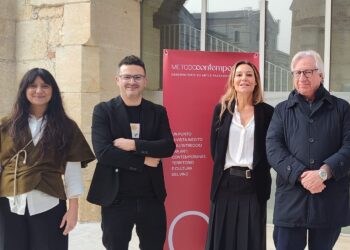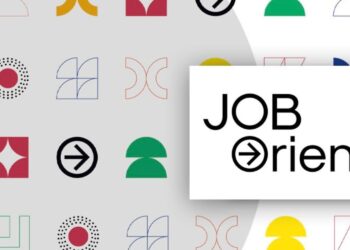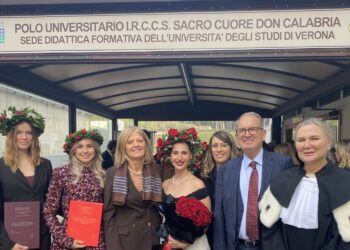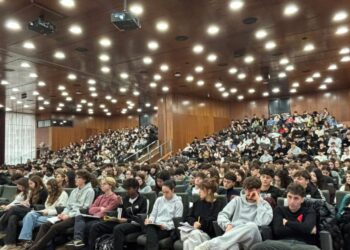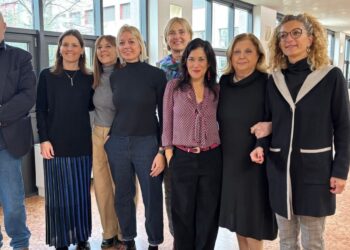The most comprehensive study of whole cancer genomes to date has been completed. This is a unique achievement for the international scientific community – so much so that it made the front page of the latest issue of the journal ‘Nature’ (Volume 578 Issue 7793, 6 February 2020) – because it provides an invaluable resource for understanding the causes, development and evolution of different types of cancer, thus laying the foundations for the development of new classifications, diagnoses and therapies in oncology.
The University of Verona is one of the key players of the study, representing Italy in the International cancer genome consortium since 2010. The multidisciplinary team is coordinated by ARC-Net, the applied research cancer centre established by the University of Verona and the University Hospital of Verona (AOUI – Azienda ospedaliera universitaria integrata di Verona), headed by the anatomic pathologist Aldo Scarpa and founded with the support of the Fondazione Cariverona.
This important achievement was announced on Tuesday, 11 February at a press conference held in the Barbieri hall of Palazzo Giuliari (Via dell’Artigliere, 8, Verona) by Pier Francesco Nocini, the University’s rector, Aldo Scarpa, director of ARC-Net – Centre for applied research on cancer, Alessandro Mazzucco, president of Fondazione Cariverona, Francesco Cobello, general director of the University Hospital of Verona (AOUI), Michele Milella, director of Oncology at AOUI, Angelo Paolo dei Tos, director of Pathological anatomy at the University of Padua, and Rita Lawlor, director of the ARC-Net biobank.
THE STUDY
The completion of this project is the culmination of a decade of revolutionary work in the study of the cancer genome through the collaboration between the International consortium ICGC (of which the University of Verona is part) and the American consortium TCGA. The international team of over 1,300 scientists and clinicians from 37 countries worked on the project ‘Pan-cancer analysis of whole genomes – PCAWG’, which provided the most comprehensive analysis available to date of 2,600 genomes of 38 different types of cancer.
Previous studies had focused on 1% of the genome, the part of the DNA that encodes for proteins. The PCAWG project has explored in considerably greater detail the remaining 99% of the genome, including key regions that control switching genes on and off. Metaphorically speaking, if the genome can be seen as a recipe for living cells and cancer as a process that results from recipe changes (mutations in the genome), then previous efforts have sought changes in the list of ingredients, while this new project also looks for changes in the instructions for the use of those ingredients.
“This study – states prof. Scarpa – helps answer one of the most important (and so far unresolved) questions in medicine: why two patients suffering from what appears to be the same type of cancer have very different outcomes and respond differently to the same therapy? The results of the PCAWG project show that the reasons for these different behaviours are written in the DNA. The genome of each patient’s cancer is unique, but there are a finite set of recurring patterns. This new information will give rise to studies that will identify all these patterns in order to optimise diagnosis and treatment.
“This work – says the rector Pier Francesco Nocini – is a milestone for the scientific community, the culmination of a worldwide collaboration that has seen Verona protagonist and proud to represent Italy in this revolutionary work in the study of the cancer genome that will change the way we tackle this disease”. The rector adds that, out of 1,300 researchers from the 37 participating countries, 35 are from institutions based in the Veneto region: the University and the University Hospital of Verona (33), the University of Padua (1) and the Hospital of Treviso (1).
The work just published lays the foundations for the second phase of the activities of the ICGC consortium which consists in the implementation of the project called ARGO (Accelerating research in genomic oncology) which will translate the results from sequencing the cancer genome of individual patients into personalised and “precision” therapies. This project once again sees Verona at the forefront in the identification of new therapeutic targets in cancers so far considered “orphans” of targeted therapy. “We expect an acceleration in clinical research – adds the rector – aimed at the development of precision medicine in oncology through the introduction of new molecular diagnostic methods in national health systems, on which to base more precise therapeutic choices. We also expect to be able to unveil the mechanisms of development of resistance to therapy, which often occur and cause relapses, and to be able to understand how to overcome them”.
THE ROLE PLAYED BY VERONA AND THE VENETO REGION
The contribution of Verona to the study was made possible thanks to the multidisciplinary collaboration between the biobank of the ARC-Net centre directed by Rita Lawlor, and the researchers of the centre and anatomical pathology directed by Aldo Scarpa, the clinicians and surgeons of the Pancreas institute directed by Claudio Bassi, Hepatobiliary surgery directed by Alfredo Guglielmi, and Medical oncology directed by Michele Milella. An important contribution was also made by the Anatomical Pathology of the University of Padua and the Cà Foncello Hospital in Treviso, whose contribution was coordinated by Matteo Fassan and Angelo Paolo dei Tos.
In this context, the University Hospital of Verona (AOUI) has benefited from the innovations resulting from the University’s participation in the ICGC, able to introduce innovative molecular diagnostic methods as early as 2014. During this time, the AOUI contributed by establishing multidisciplinary oncology groups, comprised of specialists from the many fields of study (oncology, surgery, radiology, anatomical pathology, gastroenterology and endocrinology) who work in a highly integrated and coordinated way for the complete care of patients affected by neoplasia.
“A special thanks goes to the patients who have allowed the use of their biological material for the creation of the biobank – points out Rita Lawlor – thus making an essential contribution to this important research and historical event”.
The study was made possible by funding awarded by Miur (the Italian Ministry of education, university and research) to the ARC-Net Centre – which enabled Italy to join the International cancer genome consortium (ICGC) in 2010 – in addition to funding from the Italian association for cancer research (AIRC), and the Ministry of health through the Italian foundation for the study of pancreatic diseases (FIMP).
DEVELOPMENTS
Based on the genomic landscape drawn in this study, the International cancer genome consortium has launched the second phase of the research, which consists in the execution of the project called ARGO, which stands for “Accelerating research in genomic oncology” (ICGC-ARGO). The ARC-Net centre is one of the founders of the ICGC-ARGO consortium, and Rita Lawlor is a member of the management committee and the working group on ethics, policy, and governance.
The project aims to use new molecular tests designed and developed within the consortium to provide patients with a wider range of therapeutic possibilities than is possible today. This second stage of the project involves the organisation of international clinical trials using both innovative drugs and drugs already in use, based on the indications of the molecular abnormalities present in the cancers of individual patients.
The ARC-Net centre, leader of the Italian contribution to the ICGC-ARGO Consortium, is working to create a network of centres of excellence in oncology. As of today, part of this network is the Veneto oncology institute, the National cancer institute in Milan, the “Regina Elena” national cancer institute in Rome, the “Pascale” national cancer institute in Naples, and the “Agostino Gemelli” university polyclinic in Rome.
